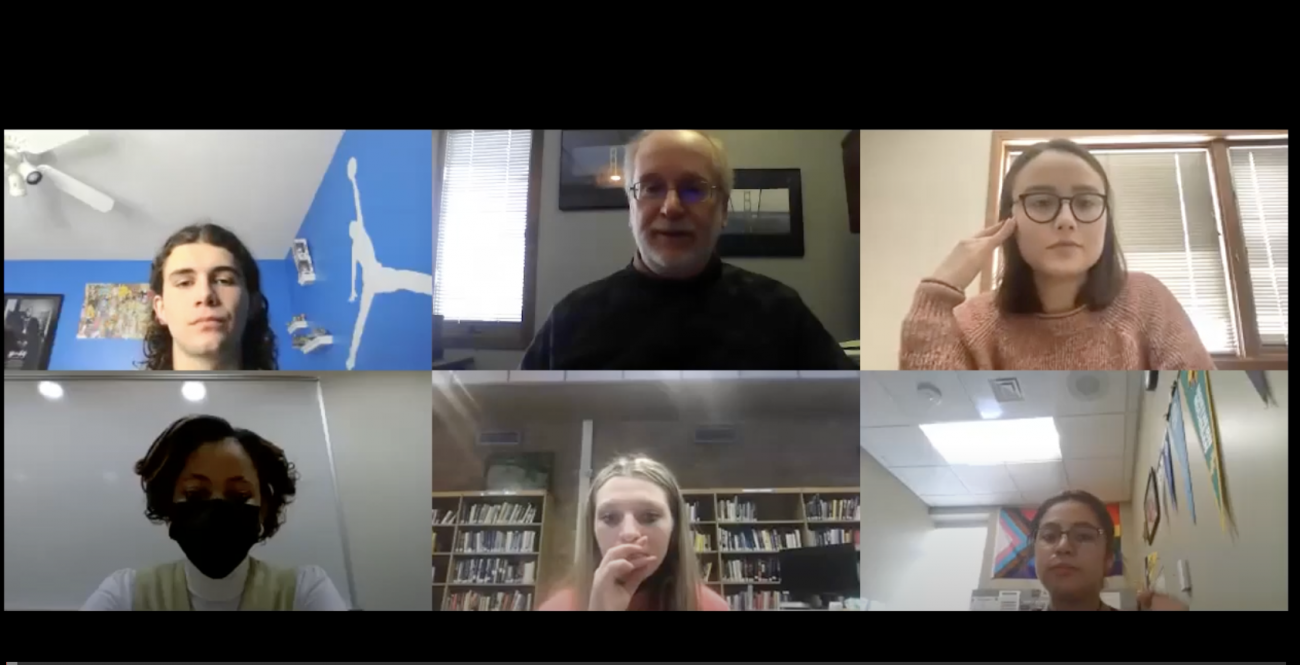Michigan high school seniors crave normality after COVID

For Ben Schollett, the signature COVID moment of his high school experience involved a tape measure.
One day last school year, the principal at Traverse City West Senior High School walked into one of Ben’s classes with the measuring tape and a seating chart, carefully measuring out 6-feet from where a student who tested positive for COVID-19 had been sitting.
The following day, just eight of the 30 students returned to class. “That’s, just for me, something that I don’t think I’ll ever forget,” said Schollett, now a senior. “It’s like the kids were radioactive…They had to be out of there immediately.”
Related:
- Gretchen Whitmer drops mask suggestion, Michigan getting ‘back to normal’
- The pandemic isn’t over. What Michigan needs to do if there’s a next wave.
It’s been a long two years for the Michigan high school class of 2022. Students had just received a taste of high school in their freshman year, but then the COVID pandemic upended the spring of sophomore year. And junior and senior years felt disjointed, difficult and, at times 一 very sad.
Schollett was one of four high school seniors — the others were from Novi, Grand Rapids and Hazel Park — to participate in a Zoom session with Bridge Michigan to discuss their experiences. A video of the chat can be found here.
All four students contracted COVID-19 at some point. Three had a family member or someone close to them die or hospitalized from the virus. They all plan to go to college and said they hope their next chapter will have less doubt, and more consistency. But they also learned life lessons they believe will benefit them in the future.
“I think I'm just a lot more grateful and conscious of the things and the people I have in my life,” said Nahlia Moncrief of Novi High School.
Trying to learn during the ‘unknown’
In spring 2020, when the virus first hit, K-12 schools were closed and ordered to switch to some form of remote learning as COVID-19 morphed from a headline far away to a problem affecting every Michigan parent, student and teacher.
Chloe Herron, of Hazel Park High School, and Ben of TC West both had their spring sports seasons cut short. Ben was used to going to lacrosse after school but instead found himself at home with more time on his hands. Chloe’s softball team didn’t play, either.
When the teens’ schools started to close, it felt like a longer-than-usual spring break. But as time went on and virtual learning became the norm, it was harder to stay focused and remote school became a grinding routine.
For Chloe, every morning she would wake up, make coffee, brush her teeth and sit down at her desk.
“And then after two weeks, it just became repetitive,” she said. “I was on the same thing every day and I needed to change and that's when I just kind of woke up five minutes before class and just grabbed my computer and sat on my bed.”
There was also the anxiety that came with a little understood virus. From mid-June to the end of football season in 2020, Ben rarely saw his grandparents because he didn’t want to expose them to COVID on the off chance he had it.
“I think it's just been a lot of unknown,” Ben said. “And I would say some fear from that unknown. And my grandparents live up here and obviously (I) don’t want them to be exposed at all to COVID, don’t want me going to school, bringing it back to them. So I would say it’s more fear from not knowing exactly what's going to happen or exactly, you know, how bad it's going to be.”
At Ben’s school, there was a lot of going back and forth between virtual learning and in-person class.
Jackie Calderon, of C.A. Frost Environmental Science Academy Middle High in Grand Rapids, said she wanted a part-time job and had her mother’s permission. But she ended up waiting a year because nothing felt safe.
Navigating virtual learning
Ben said it was easy to stay involved at the beginning of virtual learning but as time passed, he became less and less motivated. He said his classes pivoted from hour-long classes to 40 minute classes.
What actually happened during a class period also changed. Jackie said in the world of virtual learning, hands-on experiences were rare.
For Nahlia, it wasn’t just the type of work but the intensity.
“I think I got a lot more work virtually,” Nahlia said. “It just felt like I got so much more work in a lot of my classes. Granted, I took harder classes my junior year compared to my sophomore year, but it just felt like the work was piling on and I just really started to not like school and as soon as I came back (to the classroom), it was almost like an ‘aha’ moment, of like ‘Oh, this is how it was beforehand.’”
Coping with loss
In February 2020, just before COVID-19 spread through Michigan, Jackie had a friend who died in a fire.
“I feel like the pandemic struck and nobody was able to grieve him properly,” she said.
She said the anniversary of the friend’s death is still really hard and the experience has propelled her to place more value on her friendships.
Others noted the large role their grandparents’ health played in their pandemic lives.
Nahlia said she considers herself “lucky in a lot of ways,” but her two great grandmothers got sick during the pandemic and, because of COVID safety measures, she wasn’t “able to be there for them in the way that I would have wanted to.”
She lost them within four months of each other.
Chloe’s grandmother had a stroke right before the pandemic hit. When her grandmother returned home, Chloe couldn’t visit because she didn’t want to put her at risk. It happened just as her school switched to online learning.
“It all kind of hit me at once,” Chloe said. “But it was something I could work through.”
‘Unforgettable’ moments
The four seniors said they’re sure that living through a pandemic during high school will shape the rest of their lives.
Jackie’s family spent the 2020 December holidays sick with COVID-19. Instead of having a Christmas dinner together, they stayed in separate rooms. So for Christmas 2021, the family celebrated in Frankenmuth.
“We can’t act like (the pandemic) didn’t happen, we have to appreciate that we got each other now and go out and enjoy what we have,” Jackie said. “And so we definitely view things from a more appreciative perspective and like there's no tomorrow.”
The seniors noticed how some of their peers handled pandemic isolation. Nahlia and Jackie remember some classmates bragging about how they were able to cheat on online classwork and tests.
Dating was also different. Jackie said she noticed some students are taking their time with dating, while Nahlia said she is surprised by how quickly people are jumping into relationships now.
“I feel like making friends became a lot easier and just talking to people because I feel like we were all kind of starving for social interaction after being in school (online) and I just feel like everyone just became a lot more bold in the sense and more social; at least in my class,” Nahlia said.
Gearing up for the future
Nahlia said the last couple of years have felt like one big “question mark” where “we don’t know really where things are going to go from here.”
“We're all hoping to have a normal college experience because most of my friends and I are going to four-year colleges and are hoping to have those normal freshmen college experiences because we didn’t get the normal end of high school experience.
“And that's a huge question mark. So we're just hoping for a little bit of normality, but it's just the fear of the unknown and not knowing what's coming.”
She is still waiting to hear back from a couple of schools but knows she wants to be on a political track with an intent to go to law school.
Ben plans to go to Albion College to study business and play lacrosse.
Chloe hopes to attend Northwood University and study business while possibly playing softball.
Jackie plans to pursue pre-med and hopes to become a trauma surgeon. She has applied to a lot of schools and said she is heavily weighing the finances of each school.
“Overall, I think I learned to never take anything for granted,” Chloe said. “...You never know what's going to happen tomorrow, a week from now, so just live like there's no tomorrow, pretty much.”
Michigan Education Watch
Michigan Education Watch is made possible by generous financial support from:
Subscribe to Michigan Health Watch
See what new members are saying about why they donated to Bridge Michigan:
- “In order for this information to be accurate and unbiased it must be underwritten by its readers, not by special interests.” - Larry S.
- “Not many other media sources report on the topics Bridge does.” - Susan B.
- “Your journalism is outstanding and rare these days.” - Mark S.
If you want to ensure the future of nonpartisan, nonprofit Michigan journalism, please become a member today. You, too, will be asked why you donated and maybe we'll feature your quote next time!





